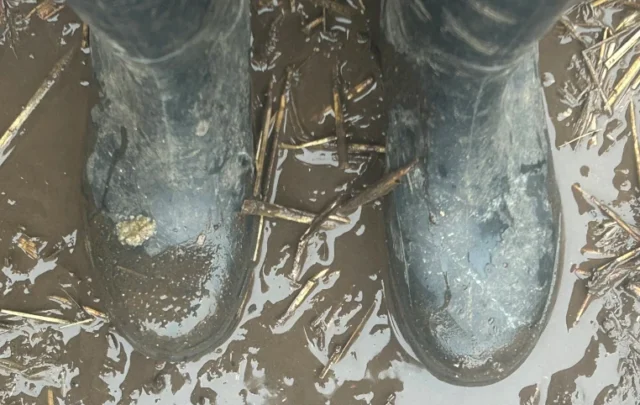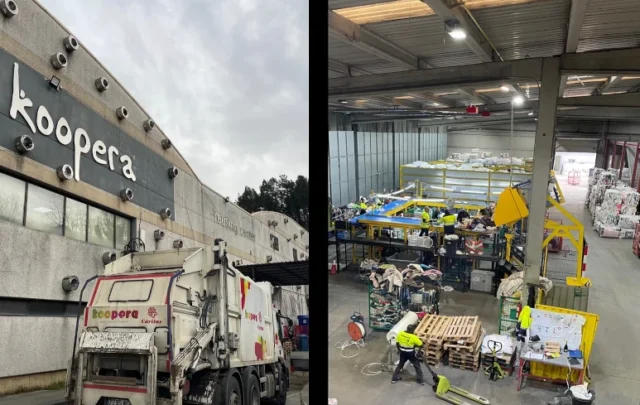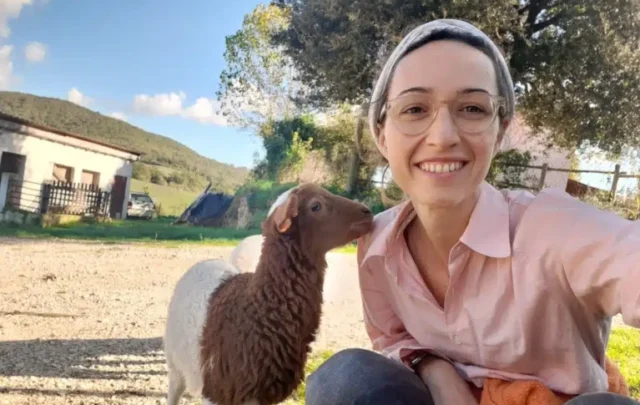
Photo by spirit of america / Shutterstock.com.
I was invited recently to sit in on animal science class at a college that has a strong agriculture program, about 10 miles away from my house. This week, the class was discussing the farm bill, and the students were supposed to be exploring what it meant to them.
The discussion was led by my friend Paula, who recently made the choice to return to school and get an agricultural degree. She talked about some of the major points of the farm bill, about how the direct commodity subsidies feed agribusiness, but how small farms such as Sap Bush Hollow derive very little (if any) direct benefit from them. She talked about how, because the Farm Bill didn’t pass in 2012, there was a temporary extension on it as part of the fiscal cliff package. The subsidies that aid corn syrup processors and ethanol blenders stayed in place. The programs that benefited small producers—such as new farmers, minority farmers, healthy food markets, renewable energy, and sustainable farming efforts—were suspended. The classroom remained quiet. Passive. Disinterested.
Paula attempted to shake them up. "Guys! This is about you! About us! About what we’re here for!" The room stayed quiet.
She moved on to the next controversial part of the Farm Bill—Food and Nutrition Assistance, which encompasses the Supplemental Nutrition Assistance Program, or SNAP, formerly known as Food Stamps. Several students began to shift in their seats. Paula put forward some numbers about the amount of money allocated to SNAP. The classroom began to writhe. Tongues clucked. I heard hissing. Paula then mentioned how many people were dependent on SNAP (in 2011, one out of every seven people in this country was getting some form of food and nutrition assistance). And with that, save for a few quiet exceptions, the classroom sprung to life:
"Welfare mothers!"
"They’re using food stamps to buy cigarettes!"
"I’m not paying for lazy people!"
"Users!"
"They just waste that money!"
Wow. So many golden educational opportunities….where to begin?
Let’s start with …
1. The meaning of hypocrisy: From the dictionary: The semblance of having desirable or publicly approved attitudes, beliefs, principles, etc., that one does not actually possess. It seems increasingly popular, in these hard economic times, to toss around accusations about who is draining the public resources. And the people who get public funds most directly under the umbrella term of "welfare" are the first ones to get pelted with stones.
Yet anyone who has driven by the farmers market on their way to buy pork chops for $1.99 a pound at the grocery store, when the local farmer can’t produce them for less than $11.00, is dipping from the same pot that holds the food stamps. The farm bill encourages factory farming by making sure feed can be purchased for less than the price of growing it, giving factory farms billions of dollars in cost discounts every year.
A portion of this savings gets passed along to the American grocery-shopping public in the form of artificially cheap food that real farmers (those of us who have to pay for the true costs of production) simply cannot compete with. Anyone who shops at a conventional grocery store for factory farmed meat or processed foods is taking a government handout, not just the "welfare mothers."
2. The meaning of irony: From the dictionary: A figure of speech in which the words express a meaning that is often the direct opposite of the intended meaning. The first farm bill was enacted on the heels of the Great Depression, with the goal of supporting America’s farmers and ranchers. That’s still the intent. Yet today, farm bill commodity subsidy payments have contributed to such an unequal distribution of market share between corporate and family-scale agriculture, that the only way many small farmers could benefit from the farm bill is through the very nutritional assistance programs that these young agriculturists were spurning. There’s no shortage of small farmers who qualify for “welfare” programs.
3. The meaning of self-defeating behavior: From the dictionary: behavior serving to frustrate, thwart, etc., one’s own intention. Here was a group of students training to be farmers and food processors. Many of them will likely want to open their own farming-related businesses some day; or they will return to family farms to pick up where their parents and grandparents left off. Some of them, unable to sustain themselves financially among the land and livestock that nourish their spirits, will have to go and work for agribusiness. If the current economy is any indication, many of them will find themselves with college debt, low wage jobs, and in need of food.
Any way you slice the pie, the Farm Bill affects these students, either because:
- it sponsors (or fails to sponsor) programs that might help them get started on the land or in a food-related enterprise;
- or because the policies of the bill greatly benefit agribusiness, thus making it tougher and tougher for family-scale farms to compete;
- or because it results in a proliferation of processed, crappy foods that pollute our bodies as well as our soil and water;
- or because it provides a food benefit that a number of them will likely need in the near future.
These kids need to understand the Farm Bill. It can help them and it can hurt them. But the only reaction they could muster was venom toward any human being who might have need of food assistance, thus the only action many of them might take would be to cheer if the food and nutrition assistance programs were cut. They’re hurting themselves with their apathy and venom.
For that matter, apathy and venom hurt all of us. The food problems, the farm problems, and the poverty issues, effect all of us. Propaganda infuses our daily lives, encouraging us to hate those in need, to judge them as irresponsible leeches on society. This hatred has become a cancer in our culture, poisoning us from the inside, making students like the ones in this classroom, who should be concerned about our nation’s food policy, content to see it fail rather than reformed, and to see more people go hungry.
By fixating on the notion that a fellow human in need is threatening to their well-being, these students are playing an active role in promoting the very social inequality that impairs their own futures. As social epidemiologists Kate Pickett and Richard Wilkinson have shown, no matter whether we are rich or poor, the more inequality there is in our culture, the greater our rates of anxiety, depression, and countless other social problems from crime to illness—for everyone.
(For those of you interested in learning more about how inequality contributes to widespread social problems across the classes, I recommend Kate Pickett and Richard G. Wilkinson’s book, The Spirit Level: Why Greater Equality Makes Societies Stronger.)
…Which leads me to the final, and most important, educational opportunity…
4. The meaning of compassion: From the dictionary: A feeling of deep sympathy and sorrow for another’s suffering or misfortune, accompanied by a desire to alleviate the pain or remove its cause. In truth, I suspect that the venom that came forth from these young people’s mouths wasn’t truly their own. They probably learned it from someone else. Most of them were too young to have come by such opinions honestly. And I can only assume that it came from people in their lives who are truly fearful, who worry that the resources they need will be commandeered for someone else’s benefit.
We are living in times when the worry about resources, financial or ecological, is very real. And the Farm Bill, for all its inconsistencies and controversies, represents our nation’s policy on these fears. As we seek to create a workable Farm Bill and a workable life, we cannot forget that the uncertainty of our neighbors will affect our own well-being. If we are going to be truly resilient, then we must be compassionate about the suffering of those around us, and we must seek ways, both through policy and through our daily individual actions, that will help to rectify this suffering.
That is simply part of being a community. And if we lose that, then we agree to a life of depredation for all and happiness for none, where only a few will survive, and no one truly thrives.
But if we can embrace compassion, then it becomes the foundation for true community resilience; where being a caring citizen and neighbor fuel a way of life where everyone has good, clean healthy food; where they come by it honestly; and where young agricultural students are able to plan a future where they can produce it freely and joyfully.
 Shannon Hayes wrote this article for YES! Magazine, a national, nonprofit media organization that fuses powerful ideas with practical actions. Shannon is the author ofRadical Homemakers: Reclaiming Domesticity from a Consumer Culture, The Grassfed Gourmetand The Farmer and the Grill. Her newest book is Long Way on a Little: An Earth Lover’s Companion for Enjoying Meat, Pinching Pennies and Living Deliciously. She is the host of Grassfedcooking.com and RadicalHomemakers.com. Hayes works with her family on Sap Bush Hollow Farm in Upstate New York.
Shannon Hayes wrote this article for YES! Magazine, a national, nonprofit media organization that fuses powerful ideas with practical actions. Shannon is the author ofRadical Homemakers: Reclaiming Domesticity from a Consumer Culture, The Grassfed Gourmetand The Farmer and the Grill. Her newest book is Long Way on a Little: An Earth Lover’s Companion for Enjoying Meat, Pinching Pennies and Living Deliciously. She is the host of Grassfedcooking.com and RadicalHomemakers.com. Hayes works with her family on Sap Bush Hollow Farm in Upstate New York.























